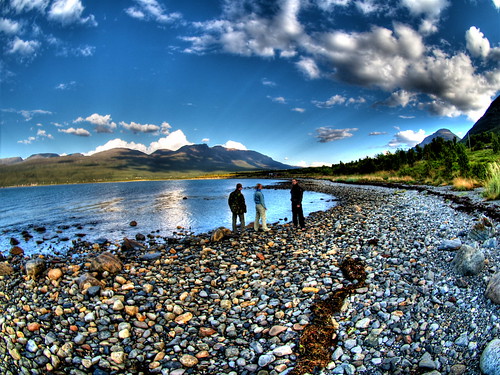Arctic Ice Free In 2008 ?
Posted by Big Gav in arctic ice, global warming
New Scientist reports that some scientists are speculating that the North Pole could be ice free in 2008
You know when climate change is biting hard when instead of a vast expanse of snow the North Pole is a vast expanse of water. This year, for the first time, Arctic scientists are preparing for that possibility. "The set-up for this summer is disturbing," says Mark Serreze, of the US National Snow and Ice Data Center (NSIDC). A number of factors have this year led to most of the Arctic ice being thin and vulnerable as it enters its summer melting season.
In September 2007, Arctic sea ice reached a record low, opening up the fabled North-West passage that runs from Greenland to Alaska. The ice expanded again over the winter and in March 2008 covered a greater area than it had in March 2007. Although this was billed as good news in many media sources, the trend since 1978 is on the decline.
Arctic ice at its maximum in March, but that maximum is declining by 44,000 km2 per year on average, the NSIDC has calculated. That corresponds to an area roughly twice the size of New Jersey. What is more, the extent of the ice is only half the picture. Satellite images show that most of the Arctic ice at the moment is thin, young ice that has only been around since last autumn. Thin ice is far more vulnerable than thick ice that has piled up over several years.
"There is this thin first-year ice even at the North Pole at the moment," says Serreze. "This raises the spectre – the possibility that you could become ice free at the North Pole this year."
The Vancouver Sun also has an article on the melting arctic - Arctic ice melting at alarming rate.
Barber and his colleagues got an even bigger surprise when they sailed north into M'Clure Strait, the main channel connecting the Northwest Passage to the western Arctic. The strait is legendary as a gateway for thick, rock-hard, multi-year ice that piles in from the Beaufort Sea, but Barber and his colleagues found nothing but clear sailing.
"It was surreal," he said. "The weeks spent on the ship were some of the most remarkable of my career. The multi-year pack ice had migrated about 150 miles (240 kilometres) north from where it has traditionally been located. So the ice-associated, high-pressure system that traditionally forms over the southern Beaufort at this time of year was displaced.
"All that cyclonic activity that was drawn in by the warm, open water not only made for some rough sailing, it also put more heat into the air, keeping the local climate warmer than usual."
Barber isn't alone in wondering whether this winter signals the climatic tipping point that many scientists have been anticipating. That's the moment in time when sea ice in the Arctic becomes so thin and vulnerable that the ice produced each winter can no longer keep up with the spring and summer melts.
Many scientists now believe that when this happens, the world will enter a new era of global change -- one that no one really understands, but that will likely have an enormous impact on the climate of the rest of the world.
Up until last summer, most scientists didn't expect that to occur for another 50 or 60 years. Even the most daring weren't willing to wager that it would happen in 15 years.
But this winter's unexpected developments in the Beaufort Sea suggest that all bets are off. Waters that used to lose 10,000 square kilometres a year in ice cover, according to scientists, currently lose at least eight times that amount. Now, some scientists are speculating that the Arctic could be seasonally ice-free in less than a decade.
"The ice is no longer growing or getting old," says John Falkingham, chief forecaster for the Canadian Ice Service, the Environment Canada agency that helps ships find a way through the Northwest Passage and other parts of the Arctic.
Cold as it was this winter in the Arctic and most parts of Canada, it wasn't enough to temper the heat that warmed the ocean and melted so much ice last summer. By the middle of last September, scientists recorded a decline of almost 50 per cent of the normal ice cover. By way of comparison, the area of sea ice lost was equivalent to 10 United Kingdoms.






